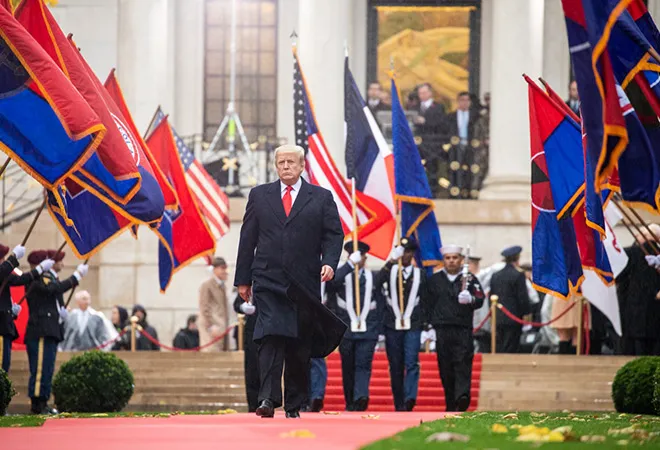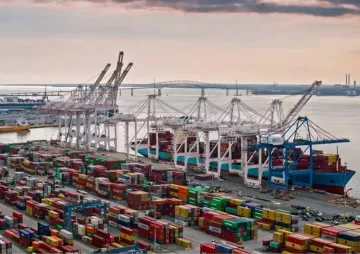
The recent US midterm elections didn’t quite produce the blue wave that most Democrats were expecting, but it did yield positive results. The Democrats captured back the House of Representatives, gleaning momentum into the 2020 race.
Candidate names have been tossed around as to who will be the eventual challenger to run against President Donald Trump. Texas Congressman Beto O’Rourke came close in a valiant bid to unseat incumbent Republican Senator Ted Cruz. And while his bid proved futile in the end, there is optimism and some murmur of a 2020 run.
The eventual Democrat nominee in 2020 would have survived grueling primaries and be confronted with a slew of domestic problems at home. However, in terms of foreign policy challenges, there is a need to go back to the drawing board.
The Trump administration’s ‘America First'<1> foreign policy has made it an America alone policy.
The Trump administration has adopted a path of economic nationalism and as a result of which has jettisoned America’s crucial positions on security, trade and climate change.
All new Presidents coming into office are confronted with a slew of challenges from how to establish a sound economy and obtain a sensible foreign policy. However, a Democrat administration in 2020 would be confronted with major challenges of undoing the geopolitical imbroglio of the Trump administration while reasserting America’s place on the world stage.
Broadly, America’s concerns at this point are multifold. Kerfuffle in the West Asia is no stranger to the desk in the Oval Office, however right now the problem has been exacerbated.
For too long, the US alliance with Saudi Arabia<2> served various purposes. The Kingdom is seen as the epitome of the Muslim world and the American gateway and ally to the Sunni dominated Gulf countries. With 18% of the global oil reserves, they are the largest exporter of the commodity. They are one of America’s largest arms importer and most importantly a bulwark against a perceived antagonist Iran.
However, the recent murder of prominent Saudi journalist Jamal Khashoggi<3> by Saudi agents inside the Turkish consulate has raised serious red flags. While Saudi Arabia has long flirted with human right violations, press freedoms and subverting dissidents, past administrations have never held the Kingdom accountable.
America’s liberal hegemonic presence has enshrined the principles of free speech, human right protections and freedom of the press. By coddling Riyadh, the United States will not only come across as weak, but complicit with totalitarian regimes. If Washington can take harsh stances on Tehran, Riyadh should be no exception.
It’s time the US reassessed its relationship with both nations. Since 1979, a once moderate western Iran turned into an anti-American theocracy.
America has been complicit in its dealings from overthrowing Mossadegh to installing an opulent sycophantic Shah, to being clueless against a bellicose Ayatollah. The fundamentalist set-up in the last four decades has been a concern to many in Washington. The prime worry is Iran’s conviction to developing nuclear Arsenal, which poses an existential threat to its allies in the West Asia, most notably Israel.
The Joint Comprehensive Plan of Action, (JCPOA) was a landmark agreement that brought Iran to the negotiating table. Diplomacy was the chief weapon and it worked wonders in getting Iran to scale back on their nuclear programme and allow western inspectors into their facilities. In return, sanctions against the Islamic Republic were to be rolled back.
The Trump administration has undone the diplomatic initiative by pulling out of the JCPOA<4>. Not only will this lose American leverage, but it will also distance the US from allies such as France and Germany. Antagonising Iran through sanctions is not the way forward, a new deal must be reached with Tehran.
Presently a Cold War between Riyadh and Tehran is being fought across Yemen, Syria and Lebanon. Assuaging Tehran’s concerns will help bring more stability in these conflict zones and help defeat the Islamic State, the hardline Sunni caliphate.
Staying with the West Asia, President Trump’s decision to acknowledge Jerusalem<5> as the capital of Israel has gone against successive decades of US foreign policy. The immediate priority for the next candidate to reestablish successive Democratic and Republican administration’s goals to work towards an amicable two state solution.
In Europe, Trump has repeatedly moved away from US allies and NATO. The President has mollycoddled to Putin and Russia and regards NATO as redundant and as a means for European nations to freeload at the expense of the US. NATO is of paramount importance given it’s a strong security apparatus against Moscow’s adventurism in Eastern Europe.
Geopolitics today largely revolves around trade, and in the face of protectionism, President Trump has slapped tariffs on European steel and aluminum.
The next administration will have to work hard to maintain trade deals such as NAFTA. The President claims to understand deals better than anyone else, however the ‘Real Art of the Trade Deal’ is that no one wins in a trade war. The consumer loses, and it hurts the exchequer.
The elephant in the room, is always the dragon – China.
The Trans-Pacific Partnership or TPP was a landmark trade deal that not only signaled America’s pivot towards Asia, but it helped counter the Chinese hegemon in Asia. Several of the US’ Asian allies are facing the brunt of Chinese belligerence in the South China Sea. By rolling back on the TPP, the United States has conceded an ‘own goal’. China has won, without even stepping on the field. It is of vital importance that the US re-enter the TPP while the doors remain open.
The Quad agreement between the US, Australia, India and Japan is a strong message to Beijing, that adventurism in the South China Sea will not be tolerated. India is a strong democratic counterweight to China and its economy, like China is on the ascendancy. America would look to India to establish more robust defence and trade deals with India to see it as a bulwark to China.
However, the China paranoia is a larger issue within the American psyche. Since the end of the Cold War, America has espoused a ruthless belief in liberal hegemony. China’s<6> political and economic integration assumed that China would share America’s liberal, pluralistic and democratic values.
However, that’s not been the case and successive administrations have targeted China as a cheat in the trade arena and looked at China as a geopolitical rival. However, rivalry doesn’t need to mean war.
The liberal hegemony was based on economic integration and open economies. China’s burgeoning economy was and is par for the course. It’s important for Washington to realize that China is not the Soviet Union, and this isn’t a Cold War 2.0. There is no ideological battle at stake. Instead, China must be allowed to peacefully rise. All great powers will spread their sphere of influence and Beijing will do the same.
The US must only act as and when a dispute or violation is taking place, such as unlawful Chinese expansion in the South-China Sea. A zero-sum game to contain China will hurt American interests and the global economy. China is intertwined in the American economy, it is the largest investor in US treasury bonds and hurting Beijing would eventually hurt Washington.
The Afghanistan-Pakistan dossier or better known as Af-Pak strategy to Washington insiders seems to be a conundrum more complicated than the West Asia. There seems to be a case of falling into the sunk cost fallacy. Given the time and heavy investment in Afghanistan, there is a belief that the right results in Afghanistan (whatever they may be) will be around the corner.
Negotiating with the Taliban has been seen as a viable option. Myopia is rampant in D.C, after all the Taliban were the original Islamic State with their codified sharia laws, merciless beheading and stoning and no rights for women and minorities.
In all of this, Pakistan has been determined to keep Afghanistan as a vassal state and development aid to Afghanistan via India has left Islamabad paranoid. President Trump’s brazenness has seen him call out Pakistan for its links to proxies with various terror groups. Islamabad and Washington have long had a ‘with friends like approach’. No matter which civilian government is in charge of Pakistan, the military holds the keys to foreign policy dossiers, particularly with regards to China, the US, Afghanistan and India. Veteran journalist Carlotta Gall, alluded to the fact that US is indeed fighting the wrong side in her book the ‘wrong enemy’.
If the US and Pakistan are truly allies, then their interests in Afghanistan, their outlook on terrorism and security need to be aligned as well.
In an ephemeral world, foreign policy can’t always be set in stone. But apropos to Stan Lee’s demise, the immortalised words from an apocryphal tale ring true for every public office – with great power, comes great responsibility.
<1> “Trump’s NATO Trip Shows ‘America First’ Is ‘America Alone’ - The Washington Post”, accessed October 25, 2018, .
<2> “Saudi Arabia: Five Reasons Why Gulf Kingdom Matters to the West - BBC News”, accessed October 25, 2018.
<3> “The Jamal Khashoggi Story so Far”, October 23, 2018, sec. Europe.
<4> “‘A Serious Mistake’: Read Obama’s Statement on Trump’s Decision to Pull out of Iran Deal”, accessed October 25, 2018.
5> “(353) What You Need to Know about Trump’s Announcement on Jerusalem - YouTube”, accessed October 25, 2018.
<6> “The End of Engagement”, The Economist, October 18, 2018.
The views expressed above belong to the author(s). ORF research and analyses now available on Telegram! Click here to access our curated content — blogs, longforms and interviews.




 PREV
PREV


